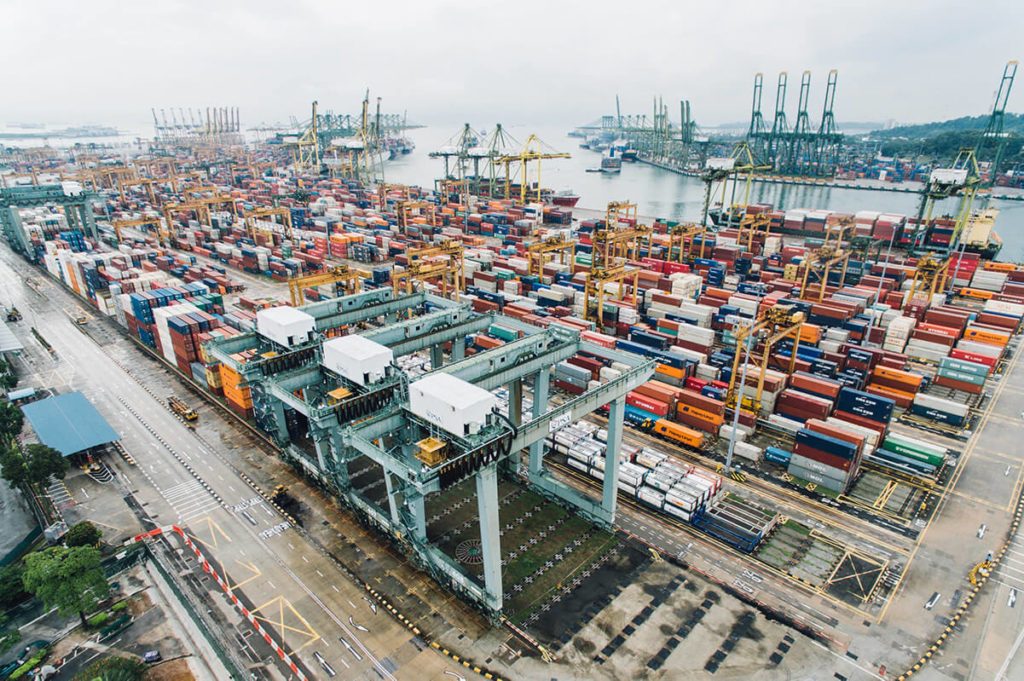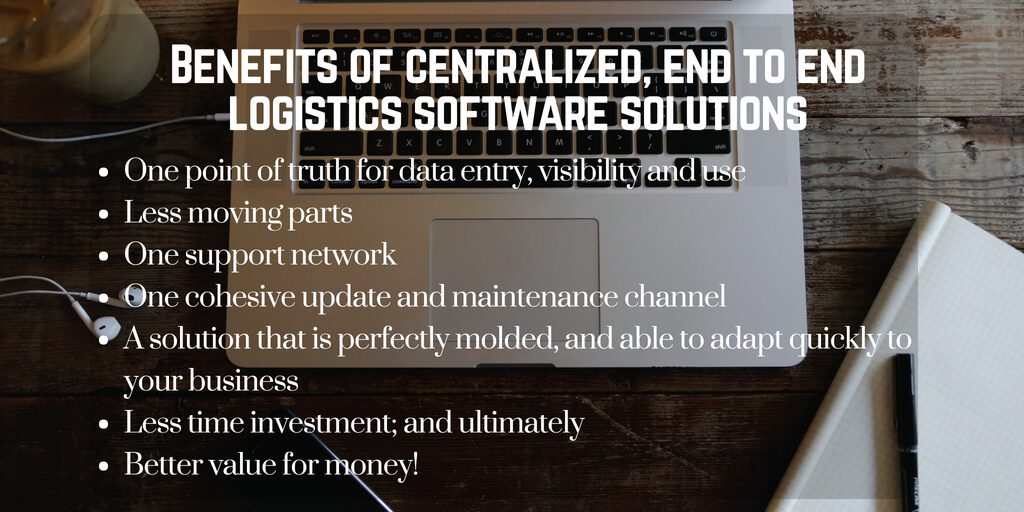If you’re in the logistics industry, then you probably know how important it is to have visibility and control right across business, end to end. It allows you to accurately record, analyse and optimise things like timing, costs, results, performance, growth and efficiency. With the many challenges and trends facing the logistics industry in 2018 and beyond, finding the right transport and warehouse software solution has never been more important!
Overall, maintaining a grip on logistics ensures the right products are getting from their origin to the end customer as quickly, efficiently and affordably as possible, while returning a profit for the businesses involved.
What Happens if You Lose a Grip on Logistics?
For industries like freight, warehousing and manufacturing, losing a grip on logistics means efficiency can go down, customer service can go down, productivity can go down…..and costs are not optimised for profit. Meanwhile, the ever increasing pace and volatility of today’s supply and demand environment, and the higher expectations of consumers, is making it harder and harder to maintain that grip on end to end supply chain logistics.
To maintain full control, there is one tried and proven solution. This solution also provides complete end to end vision across entire supply chains – we’re talking about Logistics Software Solutions. In this article, we discuss why end to end logistics software solutions are the best options, and provide some key criteria to help find the right one!

What Exactly are Logistics Software Solutions?
Logistics software solutions transfer the bulk of logistics tracking and management from manual tasks, to automated, virtual tasks.It drastically reduces the need for time and resource investment in data management and analysis, while also helping to prioritise more important areas of business by using the management by exception approach.
Logistics management systems can be extremely useful across industries, but most useful in freight, transport, warehousing, and manufacturing industries, where business productivity is all about the supply chain (i.e goods in, and goods out, and optimising efficiency). They track everything, automate efficiency analysis, and prioritise response actions to priority situations. They can offer a range of tools to help with business processes and efficiency like fleet management, workshop operation, inventory database, customer orders and services, internal and external communications, real time delivery tracking, even things like proof of delivery technology.
The catch is, there’s a range of vendors out there when it comes to logistics software solutions, which can make choosing a particular solution difficult. And before you even get to vendor selection, you need to decide whether you need a centralised or decentralised logistics software solution.
Your Logistics Software Solution Options
The two overarching options include:
- Pick and choose multiple vendors and suppliers to cover all the logistics management software solutions you need (i.e. the decentralised model); or
- Use one specialised vendor with one centralised logistics software solution to cover everything. This is the end to end approach, where the overarching logistics software solution linksup across all areas of business.
Although the decentralised model has its uses (for example, if you need to plug a hole in your existing logistics package), the centralised end to end model provides a far more simple, efficient and effective approach. It is particularly effective when the vendor is also the developer and the support provider, all in one, so they know the logistics software solution inside and out, and have a vested interest in making sure everything works as successfully as possible!

To further demonstrate why this is the best option, and highlight why it is more suitable than a decentralised, disconnected logistics software solution, let’s look into the key benefits of the centralised model in a bit more detail.
The 7 Key Benefits of One Centralised, End to End Logistics Software Solution
These seven benefits highlight why a centralised logistics software solution is the preferred choice of many businesses.
1. One Point of Truth for Data Entry, Visibility and Use
Using one logistics software solutions provider and product, you are centralising everything.
For example, your logistics data only needs to be entered, or absorbed in through one central process. After that, the data is used across any area of your business as required, and can be seamlessly integrated between business processes. This provides end to end flow of data between the whole supply chain!
If you use multiple providers and products, they may not interact with each other, and therefore any data entered is contained within a cilo, and disconnected from other parts of the supply chain.
Data may then have to be entered multiple times in different software tools, duplicated for use across business processes and areas. This not only creates multiple sources of the same data, opening up the risk of anomalies, it requires multiple amounts of effort, tracking, analysis and response. It obscures end to end visibility of your supply chain data.
While centralised, end to end logistics software solutions are extremely transparent, making it very easy to track what is going on at any stage of the supply chain.
2. Less Moving Parts

Using one centralized logistics software solution reduces the complexity of your entire software system.
It’s a bit like the engine in your vehicle. Everything is linked together under one hood, aiming for the same goal, to move the vehicle in the same direction, in the most efficient way.
Decentralized logistics software solutions however, could be compared to removing all the individual components of your vehicle’s engine, separating them, and placing them under separate hoods in different vehicles, controlled and serviced by separate entities. The ignition system is under one hood, the radiator is under another, the oil lubrication system is who knows where, the computer chips and combustion chambers are down the road, it’s all separated and all relying on different entities to run properly.
It sounds silly, but that is effectively what happens in the software world as well.
While we can barely even imagine how a ‘’decentralized’ vehicle would look, let alone run, a decentralized software system will keep running, but in an extremely inefficient and clunky way.
While the end to end centralized model is humming together, under one hood, towards the same end goal.
3. One Vendor for Support
Centralized logistics software solutions benefit from one central support system, that will likely know the ins and outs of everything, with great capacity to solve any issue.
When the vendor is also the developer and the support agency, they have complete accountability for the product and its performance.
Bad support will result in bad reviews and severely impact business. While good support will have the opposite effect. It ensures their product is highly useful, efficient, and successful, servicing the customer exactly how they need.
When using a decentralized logistics software solution, your support network may be separated from your software developer. The risk is, when issues arise, each company suddenly uses the “we’re not accountable” excuse.
You might be paying extremely good money for software support, but if the support agency is not invested in the software product, they can sap your support resources without pressure to actually solve the problem. It could in fact, suit them to be coming back time and again to investigate software issues!
Centralized end to end logistics software solutions can completely remove that risk!
4. One Cohesive Channel for Updates, Upgrades and Maintenance
To maintain the health and efficiency of your logistics software solution, one centralized package will create a far more efficient model than decentralized options.
With a decentralized model, software solutions may be spread out amongst a variety of suppliers and support networks. All standard maintenance processes will also be spread out, creating complexity and a disconnected software network.
Update processes may not coincide, creating multiple delays and slow down periods for your business.
With centralized logistics software solutions, one central vendor could simply perform these processes in one coordinated approach, notifying you once, and doing the update or maintenance work once.
5. One Solution That Fits Like a Glove

With centralized logistics software solutions, you will have end to end business software, which can be tailored to your business in every way.
All components will talk to one another and work together, laying a virtual framework for your business to grow around.
Further, because you will have one provider who is also your support network, you can adapt your software to change very quickly, through one communication channel.
Decentralized logistics software solutions will be the complete opposite. Some parts may fit perfectly, while some others may not. Software components may not talk to and work together, creating unnecessary issues and processing delays. The worst consequence is the potential for obstacles when trying to adapt your logistics software solution to change. You may need to communicate with multiple providers and multiple support networks to line everything up.
Then you run into the update and upgrade issue again, where they all have to do it in their own, uncoordinated way. Or you have to waste time trying to coordinate them yourself!
This leads us to the next benefit of centralized end to end logistics software solutions.
6. Time Savings
Ultimately, with a centralized logistics software solution model, you will save huge amounts of time which could be wasted on organization and processing delays caused by decentralized logistics software solution models.
You will save time in all of the following areas:
- Creating your complete logistics software logistics solution package
- Tailoring logistics software components to your business
- Data entering and transfer between business units and processes
- A centralized support network
- A single transparent channel for updates, upgrades and general maintenance
- An interconnected, centralized portal for change, ensuring you can quickly adapt your logistics software solution to changing business requirements.
With a decentralized model, you will need to invest more time and resources into every one of these areas.
7. You Get What you Pay For

A centralized overarching logistics software solution may seem like a more expensive option at first, but when you weigh up the benefits verse the negatives of a decentralized model, it will usually be the more affordable model in the long run.
Time is money, and all the time you save using centralized logistics software solutions will really show.
Further, you will have one contract, one set of conditions, and one payment method. While a decentralized model could have multiple contracts, conditions, and payment methods. This will inevitably require more time and effort to manage your contracts, and more organization to make sure everything lines up.
The benefits of a centralized model are clear and numerous. The next issue to resolve is, with so many options out there, how do you choose a particular centralized logistics software solution?
How to Choose Particular Logistics Software Solutions
Once you settle on the centralized logistics software solution model, you can start to narrow down which vendor will suit you best.
Here is five key considerations to help decide on a particular logistics software solution vendor.
1. Do they have all the tools and components your business will need?

Logistics software solutions can be made to monitor and manage almost many different business processes, but will it have the right tools for you?
Some companies specialize in certain niches, while others are generalists. Both can be a good option depending on your business needs. For example, if you’re business is in freight,warehousing or manufacturing, make sure you approach a logistics software solutions vendor who will have all the tools relevant to that industry such as sign on glass technology.
2. Does their software use the management by exception approach? Or simply track data but rely on manual unautomated management?
Management by exception is a way for your business to prioritize your resources away from everyday tasks (which can be automated by your logistics software solution) and focused on exceptional unexpected circumstances.
This ensures everyday tasks do not sap management resources, and affect or slow productivity and growth. It is an invaluable logistics management approach, which is a huge asset in today’s fast paced and highly volatile supply and demand environment.
3. Is the product highly customizable to your business needs, and able to quickly be changed to adapt to changing requirements?
Customisation is key to making sure you get the best value for money. For some products, you have to pay for excess tools or components you don’t need, while for other you need certain tools which they don’t have, or which cannot be perfectly customized to suit your business needs.
Make sure you find a vendor who can customize their product down to the finest details.
4. Does the subscription model suit you?
Licenses and subscriptions vary amongst logistics software solution vendors.
Annual subscriptions can provide budgeting certainty, but they will also lock you in, reducing your ability to adapt to change, should you need to alter your software package.
Monthly subscriptions are the best if you want to maintain the ability to adapt to change or scale up or down with business growth.
5. Do they have a long history in the business and a proven track record?
Many startup companies can talk the talk, but not walk the walk. The online software industry is filled with hopefuls who may have great skills at making their website look professional, but be lacking in practical logistics solutions and industry experience.
Make sure you find a vendor who know your industry back to front! Experience is the key.
Logistics Software Solutions Summary
The benefits of centralised end to end logistics software solutions are plain to see. Logistics may be a complex and often volatile area of business, but the choice about how to deal with them is simple.
By choosing the right logistics software solution, you can avoid a potentially complex and disconnected combination of software, and the many risks that come with it!

To recap, the benefits you will receive from centralized, end to end logistics software solutions include:
- One point of truth for data entry, visibility and use
- Less moving parts
- One support network
- One cohesive update and maintenance channel
- A solution that is perfectly molded, and able to adapt quickly to your business
- Less time investment; and ultimately
- Better value for money!
Unless you are looking to plug a small gap in your existing logistics software package, centralized logistics solutions are the smartest option. To further discuss your business needs and find and shortlist the most suitable logistics software solutions, get in touch with the team at Infocomm.
Frequently Asked Questions
What is the biggest advantage of seeking one centralised logistics software solution?
The biggest advantage is the time (and subsequently money) you will save by centralizing all of your logistics processes, as opposed to spreading them amongst vendors and support agencies.
You will potentially save time in every aspect of software installation, use and management, because there is one central point of truth for everything, rather than spread amongst different vendors and different types of software.
What is the most efficient approach to managing logistics through software?
The most efficient approach is using one logistics software solution to monitor and manage all of your logistics. It is the only way to truly outcompete others in the industry (because the most efficient businesses will be using this model), and maintain a level of visibility and control over today’s volatile business environment.
How can I find the best logistics software solution?
The best way is to first, analyse your business, identify all your business processes and requirements, and then approach an IT support company or logistics software solution vendor to start asking questions, and link the most appropriate solution to your business.
Most good logistics software solution vendors will be able to give you a logistics software product demo before committing to a longer term, and this is a great to analyse its suitability for your business.

